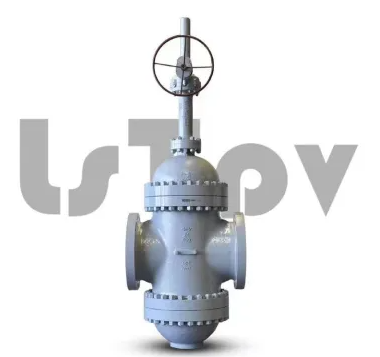What is slab gate valve?
Introduction
In the realm of fluid control, gate valves play a vital role in regulating the flow of liquids and gases in various industrial applications. Among the different types of gate valves, the slab gate valve stands out as a robust and versatile solution for controlling the movement of fluids. In this article, we will delve into the world of slab gate valves, exploring their structure, function, applications, and the benefits they offer in various industries.

The Basics of Slab Gate Valves
A slab gate valve, often referred to as a through-conduit gate valve, is a type of linear motion valve used to control the flow of fluids in pipelines. Unlike other gate valves, which have a wedge-shaped gate, slab gate valves feature a flat or slab-like gate. This design ensures a full-bore opening and a minimal pressure drop, making them particularly suitable for high-pressure and high-temperature applications.
Key Components of a Slab Gate Valve:
Body: The valve body provides the main structure of the valve, including the inlet and outlet connections. It is designed to withstand high pressures and temperatures.
Gate: The flat gate is the central component of the slab gate valve. It moves up and down to control the flow of fluids. When fully open, the gate creates a straight-through conduit for the fluid to pass.
Seats: The seats provide a sealing surface for the gate, preventing leakage when the valve is closed. Slab gate valves typically have two seats on each side of the gate.
Stem: The stem connects to the gate and is used to operate the valve. Turning the stem moves the gate up or down, allowing for precise control of the fluid flow.
Actuator: In some cases, slab gate valves are equipped with actuators, such as electric or pneumatic actuators, to automate the valve operation.
Function of Slab Gate Valves
The primary function of a slab gate valve is to control the flow of fluids through a pipeline. This is achieved through the movement of the gate, which can be raised to allow fluid to pass or lowered to shut off the flow completely. When the valve is fully open, the gate forms a direct, unobstructed path for the fluid, resulting in minimal pressure drop.
Key Operating Steps of a Slab Gate Valve:
Open Position: In the open position, the gate is lifted, allowing the fluid to flow freely through the valve.
Closed Position: When the valve is closed, the gate is lowered, forming a tight seal with the seats and preventing the flow of fluid.
Applications of Slab Gate Valves
Slab gate valves are used in a wide range of industries and applications due to their unique characteristics and capabilities. Some common applications include:
Oil and Gas Industry:
Slab gate valves are widely used in the oil and gas sector for controlling the flow of crude oil, natural gas, and other hydrocarbons. Their ability to handle high-pressure and high-temperature conditions makes them essential components in offshore drilling rigs, refineries, and pipelines.
Petrochemical Industry:
Additional resources:Revolutionizing Drilling Techniques: Are Old Methods Obsolete?
Is Lost Wax Casting the Future of Home Decor?
Which Angular contact ball bearings offer the best durability for mining equipment?
What are drawworks on an oil rig?
Are Electromagnetic Relief Valves Worth the Investment?
What does TC mean on oil seal?
Is investing in a high-quality truck clutch replacement worth the cost in the purchase stage?
In chemical plants and petrochemical facilities, slab gate valves are employed to manage the flow of various chemical compounds and processes. These valves are essential for ensuring the safety and efficiency of chemical production.
Water and Wastewater Treatment:
Slab gate valves are used in water treatment plants and wastewater facilities to regulate the flow of water and sewage. Their ability to handle large flow rates and high-pressure environments is crucial for maintaining the integrity of these systems.
Mining Industry:
Mining operations often require the use of slab gate valves to control the flow of slurry and abrasive materials. These valves are known for their durability and resistance to abrasive particles.
Power Generation:
In power plants, slab gate valves play a key role in controlling the flow of steam, cooling water, and other fluids in both fossil fuel and nuclear power generation processes.
Pipeline Transport:
Slab gate valves are frequently employed in long-distance pipelines that transport oil, natural gas, and other fluids. Their low pressure drop and ability to provide a secure seal are crucial for safe and efficient transportation.
Benefits of Slab Gate Valves
Slab gate valves offer several advantages that make them a preferred choice in many industries:
Full-Bore Design: The flat gate of a slab gate valve creates a full-bore opening, minimizing flow restrictions and pressure drop. This is particularly beneficial in applications where efficient flow is critical.
High Pressure and Temperature Resistance: Slab gate valves are designed to withstand extreme operating conditions, including high pressures and temperatures. This makes them suitable for challenging environments in the oil and gas industry, among others.
Excellent Sealing: When closed, the gate forms a tight seal with the seats, preventing leakage and ensuring the integrity of the system.
Minimal Maintenance: Slab gate valves are known for their reliability and durability, requiring minimal maintenance over their operational lifespan.
Bi-Directional Flow: Slab gate valves allow for bidirectional flow, meaning they can control the flow of fluids in both directions.
Corrosion Resistance: Many slab gate valves are made from materials that are resistant to corrosion, which is essential in industries where exposure to corrosive fluids is common.
Automation Compatibility: Slab gate valves can be equipped with actuators for remote and automated control, increasing operational efficiency.
Conclusion
Slab gate valves are indispensable components in various industries, where their robust design, high-pressure tolerance, and efficient fluid control capabilities make them ideal for a wide range of applications. Whether it's the oil and gas sector, petrochemical industry, power generation, or water treatment, slab gate valves provide reliability, safety, and efficiency in fluid control processes. As industries continue to evolve, the demand for versatile and resilient gate valves like the slab gate valve is expected to persist.
Ultimate Guide to Organizing O-Ring Kit Boxes
What is the function of a plastic cap?
Ultimate Guide to CS Tee: FAQS Answered & Insider Tips
Revolutionizing Efficiency: The Double Row Angular Ball Bearing" - How can this innovation transform your industry?
Unleashing the Power of Yingpai Drilling Machinery
Is lost wax casting the best method for producing high-quality aerospace components?
Why is wear resistance important?
224
0
0
Related Articles
-
211
0
0
-
199
0
0
-
211
0
0
-
Revolutionizing Rodeo: The Rise of DIY Bucking Machines for Sale - Can They Change the Game?
Are you ready to revolutionize the world of rodeo with your very own bucking machine?
217
0
0
-
Expert Guide: Choosing the Best Farm Machinery Pillow Block Bearings
Expert Guide: Choosing the Best Farm Machinery Pillow Block Bearings.
175
0
0
-
201
0
0
-
182
0
0
-
146
0
0









Comments
All Comments (0)